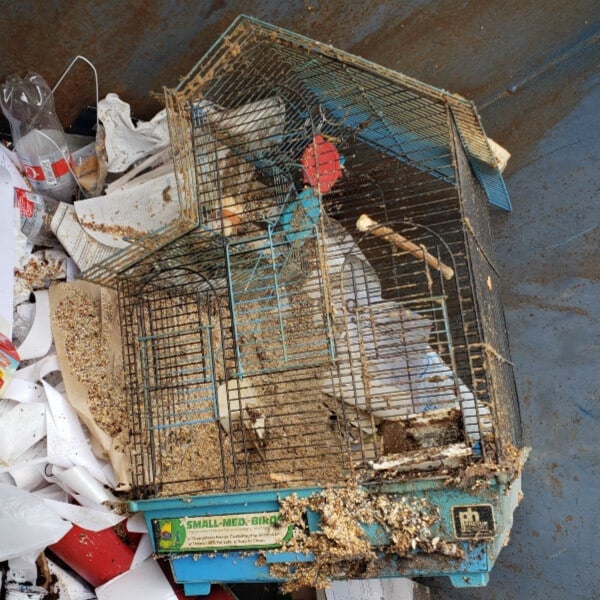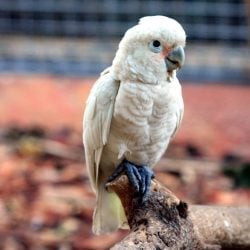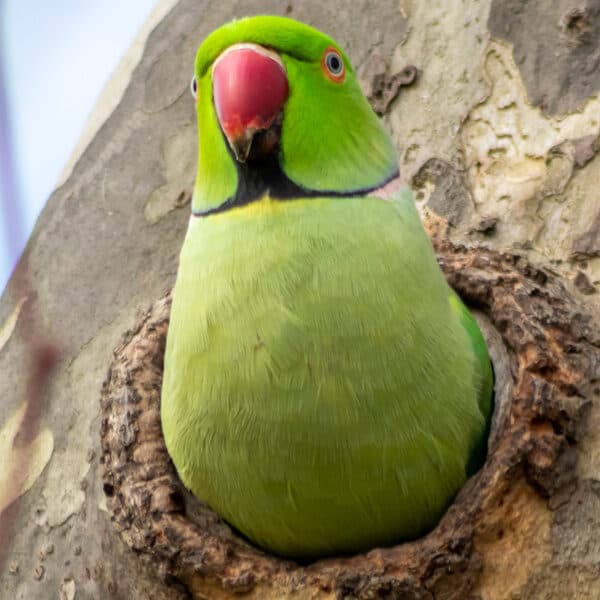Last Updated on by Mitch Rezman
Scott S. is confused about one of his rescue birds.
I’ll try to keep this long story short.
I’ve had/been around parrots for 63 years. Had my own for over 50. I currently have an open forever home for rescues. Currently have two parakeets, one Goffin, and one red belly – all well-adjusted and happy.
The little red belly (Bongo) was a breeder for seven years until I got him three years ago.
He is sweet, engaged, loving, etc., and loves to be scratched – until he doesn’t.
I’ve never had a parrot (macaws, cockatoos over the years) that would suddenly bite while being petted softly.
Bongo is not only VERY quick but also bites hard at the most unexpected times. I’ve always heard that this is typical of “breeders” but my own experience is that through love and patience the birds always come around and quit biting.
Your thoughts?
Thanks,
Scott
Dear Scott
My goodness, that bite from your red-belly rescue had to hurt, we are glad you recovered and that you figured out what he needed to turn into a happy member of your family.
All stories are not as happy of course. Birds all have different personalities and experiences that turn them into what they are. Some can get past the bad time, some can’t.
I find that if I have a bird with me and find that up to about 10 minutes it is a good visit, but after 10 minutes it can turn ugly, I make sure to try to end the visit while it is still on a good note and return the bird to its cage, or stand before the ugly sideshows.
I am not sure that the bird has been a breeder makes a difference in the aggression.
Thanks very much, Catherine for the thoughtful response.
My Goffin took the end of my nose off eight years ago. Required ten stitches, but after about a year he was settled and loving.
When I got him, he had been in a small cage for five years with small children teasing him and a family that didn’t want him, so naturally, he attacked everything in that cage. Now he’s a typical cuddly cockatoo.
My redbelly, however, is a different story. He was a breeder. He’s a sweet and well-adjusted little character who talks incessantly. But after a few years of near-constant attention (I’m retired) he still will haul off and bite hard.
I was wondering if his breeding background has a role in this behavior? I have read and heard stories over the years about breeders being incorrigible biters. Have you heard the same?
Thanks and Merry Christmas,
Scott
Dear Scott
Kudos to you for taking in all the birds. We currently have 12 birds, all rescues.
Yes, 9 are budgies that all share a large cage. Then we have an African Ringneck, Keto, Chili, a quaker and Barney a cockatiel. They all bite in some form.
Biting severely if he sees exposed flesh. We think he was mishandled by whoever cared for him while his original owner was away ill. If he just bit and released we likely could deal with the biting but he doesn’t let go so it is best we avoid the bite.
Otherwise, he is sweet and adorable and talks up a storm. He adores seeing people and greets all customers vocally. We are able to move him without issue as he LOVES his toy so much, that we just move the toy and he follows.
Chili the quaker came to us in March 2020
from a woman who suffered migraines and said the calling out he did made them worse. He nips some, but not badly. He can ride on our shoulders, hands without issue but he does graze our skin looking for anything he can pick at which is quite annoying.
Being a quaker he is very cage protective so reaching in can bring about a bite as everything in the cage is HIS!
Barney the cockatiel came to us in April 2020
(yes, we are now full up!) from a hoarder’s home.
He was found with a couple of dogs in a darkened house when the cleaning person came to gut the place. He is tame but crabby.

The cage Barney came to us in
We can pick him up, but more than not, he will then fly off and go as far as he can requiring us to go pick him up and try to return him to his cage/playpen area.
But if he sees it, he flies off again toward it and if he misses it, we have to go retrieve him again. When he was fully flighted this became a bit of a pain as he would fly off and circle the room a number of times before we could finally wrangle him to his cage. We finally had to clip his wings as this got old fast and we are old too.
We had hoped by the time his wings molted out and regrew that he would figure it out, but nope.
We had to clip him again recently as we just can’t chase him around the house every day. He is somewhat nippy and while sitting on Mitch’s shoulder will just lash out and bite him in the neck.
So we have three “sort” of tame birds, but all three will bite in varying degrees. None will let us pet them without risking being bitten to varying degrees. Barney is starting to let Mitch lightly pet him, but spins and threatens a bite in a flash. Chili won’t allow himself to be pet without a bite. And Keto, well forget getting too closely there either.
We love them all, they are used to us being around and want to be with us, we just can’t handle them.
Yes, sometimes you will have success with rescues, and sometimes not. We had a charming little white cockatiel that we rescued that loved us and let us pet her with relish.
Author Profile

Latest entries
 Bird & Parrot CareJune 20, 2025Understanding the Best Way to Use Prevue Pets Mimic Me Voice Trainer
Bird & Parrot CareJune 20, 2025Understanding the Best Way to Use Prevue Pets Mimic Me Voice Trainer Bird BehaviorJune 6, 2025How Do I Keep My Parrot From Dumping His Food Every Day?
Bird BehaviorJune 6, 2025How Do I Keep My Parrot From Dumping His Food Every Day? Birds & LightingMay 16, 2025I Am Seeking Clarity About Lighting for My Birds Cage
Birds & LightingMay 16, 2025I Am Seeking Clarity About Lighting for My Birds Cage Bird RescueApril 29, 2025How Do We Re-Home a 17 yr Goffin Cockatoo?
Bird RescueApril 29, 2025How Do We Re-Home a 17 yr Goffin Cockatoo?




[email protected]
1 May 2022Over the years, I have dealt with a lot of parrots. Very few were cuddly. Trust is a major item for an animal which is always the prey and never the predater. You have to remember that. WE are huge to them, and dangerous. For them to allow us to handle them takes a lot of trust. When they bite they are just protecting themselves. Most parrots will have a time limit on petting, so yes, pet a little then break it off. That is a good way to train for longer petting sessions, although it may never reach what you want, only what the parrot wants. It is their body after all. I have a gray who will take you face off during the day, but when they are all covered at night, I can uncover him, go in the cage and he will lay back in my hand, kiss me all over, and laugh and carry on for an hour. I think he doesn’t want the others to see that side of him, too weak. Whatever the reason, sometimes you can find those little tricks that allow more, usually, though, you need to accept what they are comfortable with.